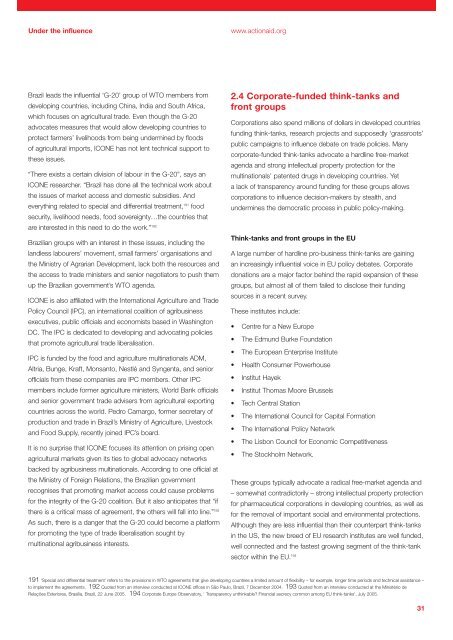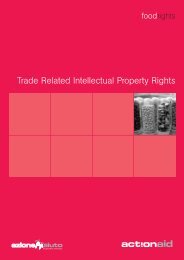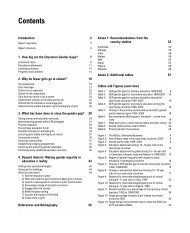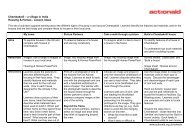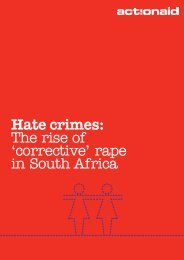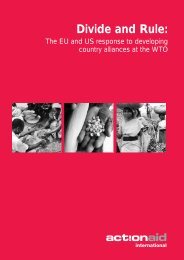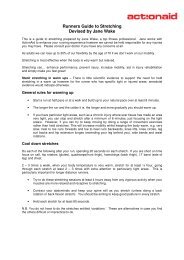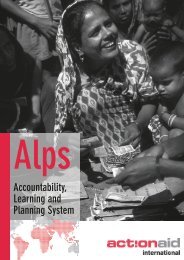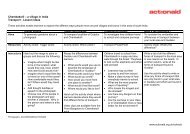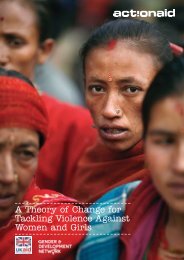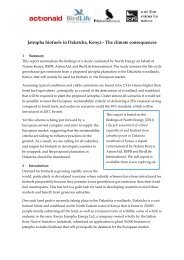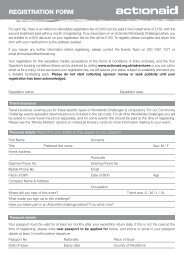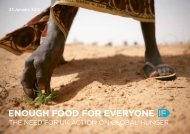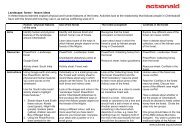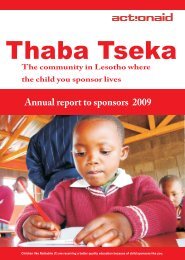UNDER THE INFLUENCE - ActionAid
UNDER THE INFLUENCE - ActionAid
UNDER THE INFLUENCE - ActionAid
You also want an ePaper? Increase the reach of your titles
YUMPU automatically turns print PDFs into web optimized ePapers that Google loves.
Under the influence<br />
www.actionaid.org<br />
Brazil leads the influential ‘G-20’ group of WTO members from<br />
developing countries, including China, India and South Africa,<br />
which focuses on agricultural trade. Even though the G-20<br />
advocates measures that would allow developing countries to<br />
protect farmers’ livelihoods from being undermined by floods<br />
of agricultural imports, ICONE has not lent technical support to<br />
these issues.<br />
“There exists a certain division of labour in the G-20”, says an<br />
ICONE researcher. “Brazil has done all the technical work about<br />
the issues of market access and domestic subsidies. And<br />
everything related to special and differential treatment, 191 food<br />
security, livelihood needs, food sovereignty…the countries that<br />
are interested in this need to do the work.” 192<br />
Brazilian groups with an interest in these issues, including the<br />
landless labourers’ movement, small farmers’ organisations and<br />
the Ministry of Agrarian Development, lack both the resources and<br />
the access to trade ministers and senior negotiators to push them<br />
up the Brazilian government’s WTO agenda.<br />
ICONE is also affiliated with the International Agriculture and Trade<br />
Policy Council (IPC), an international coalition of agribusiness<br />
executives, public officials and economists based in Washington<br />
DC. The IPC is dedicated to developing and advocating policies<br />
that promote agricultural trade liberalisation.<br />
IPC is funded by the food and agriculture multinationals ADM,<br />
Altria, Bunge, Kraft, Monsanto, Nestlé and Syngenta, and senior<br />
officials from these companies are IPC members. Other IPC<br />
members include former agriculture ministers, World Bank officials<br />
and senior government trade advisers from agricultural exporting<br />
countries across the world. Pedro Camargo, former secretary of<br />
production and trade in Brazil’s Ministry of Agriculture, Livestock<br />
and Food Supply, recently joined IPC’s board.<br />
It is no surprise that ICONE focuses its attention on prising open<br />
agricultural markets given its ties to global advocacy networks<br />
backed by agribusiness multinationals. According to one official at<br />
the Ministry of Foreign Relations, the Brazilian government<br />
recognises that promoting market access could cause problems<br />
for the integrity of the G-20 coalition. But it also anticipates that “if<br />
there is a critical mass of agreement, the others will fall into line.” 193<br />
As such, there is a danger that the G-20 could become a platform<br />
for promoting the type of trade liberalisation sought by<br />
multinational agribusiness interests.<br />
2.4 Corporate-funded think-tanks and<br />
front groups<br />
Corporations also spend millions of dollars in developed countries<br />
funding think-tanks, research projects and supposedly ‘grassroots’<br />
public campaigns to influence debate on trade policies. Many<br />
corporate-funded think-tanks advocate a hardline free-market<br />
agenda and strong intellectual property protection for the<br />
multinationals’ patented drugs in developing countries. Yet<br />
a lack of transparency around funding for these groups allows<br />
corporations to influence decision-makers by stealth, and<br />
undermines the democratic process in public policy-making.<br />
Think-tanks and front groups in the EU<br />
A large number of hardline pro-business think-tanks are gaining<br />
an increasingly influential voice in EU policy debates. Corporate<br />
donations are a major factor behind the rapid expansion of these<br />
groups, but almost all of them failed to disclose their funding<br />
sources in a recent survey.<br />
These institutes include:<br />
• Centre for a New Europe<br />
• The Edmund Burke Foundation<br />
• The European Enterprise Institute<br />
• Health Consumer Powerhouse<br />
• Institut Hayek<br />
• Institut Thomas Moore Brussels<br />
• Tech Central Station<br />
• The International Council for Capital Formation<br />
• The International Policy Network<br />
• The Lisbon Council for Economic Competitiveness<br />
• The Stockholm Network.<br />
These groups typically advocate a radical free-market agenda and<br />
– somewhat contradictorily – strong intellectual property protection<br />
for pharmaceutical corporations in developing countries, as well as<br />
for the removal of important social and environmental protections.<br />
Although they are less influential than their counterpart think-tanks<br />
in the US, the new breed of EU research institutes are well funded,<br />
well connected and the fastest growing segment of the think-tank<br />
sector within the EU. 194<br />
191 ‘Special and differential treatment’ refers to the provisions in WTO agreements that give developing countries a limited amount of flexibility – for example, longer time periods and technical assistance –<br />
to implement the agreements. 192 Quoted from an interview conducted at ICONE offices in São Paulo, Brazil, 7 December 2004. 193 Quoted from an interview conducted at the Ministério de<br />
Relações Exteriores, Brasília, Brazil, 22 June 2005. 194 Corporate Europe Observatory, ‘ Transparency unthinkable? Financial secrecy common among EU think-tanks’, July 2005.<br />
31


